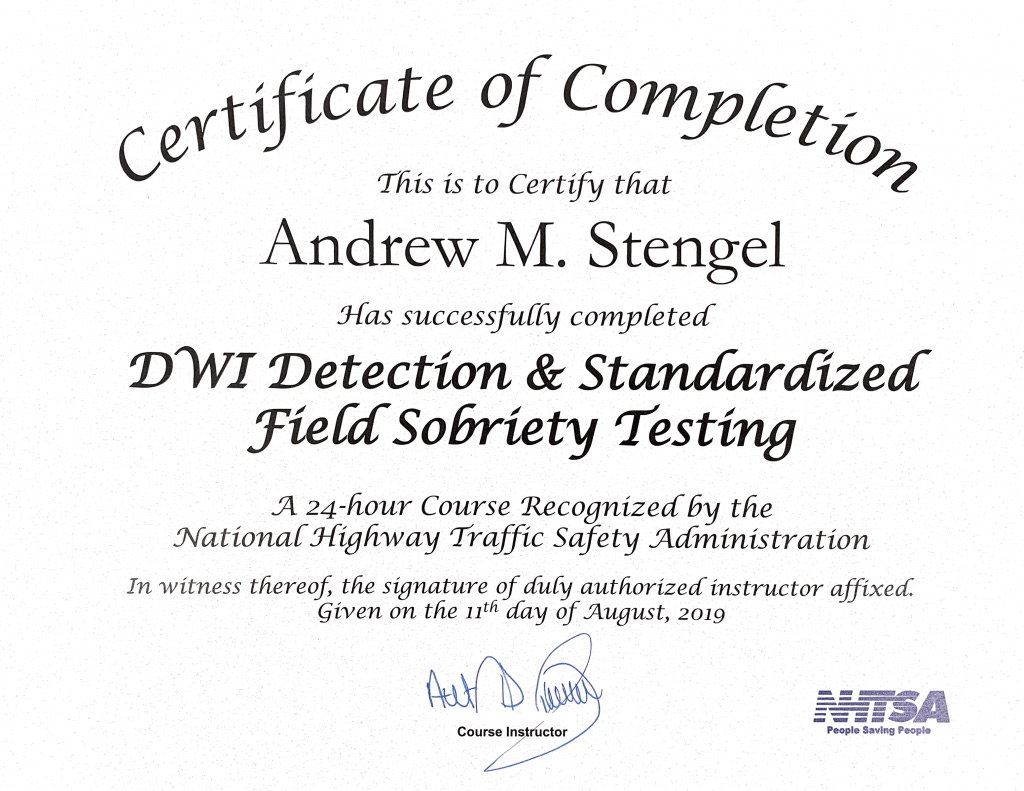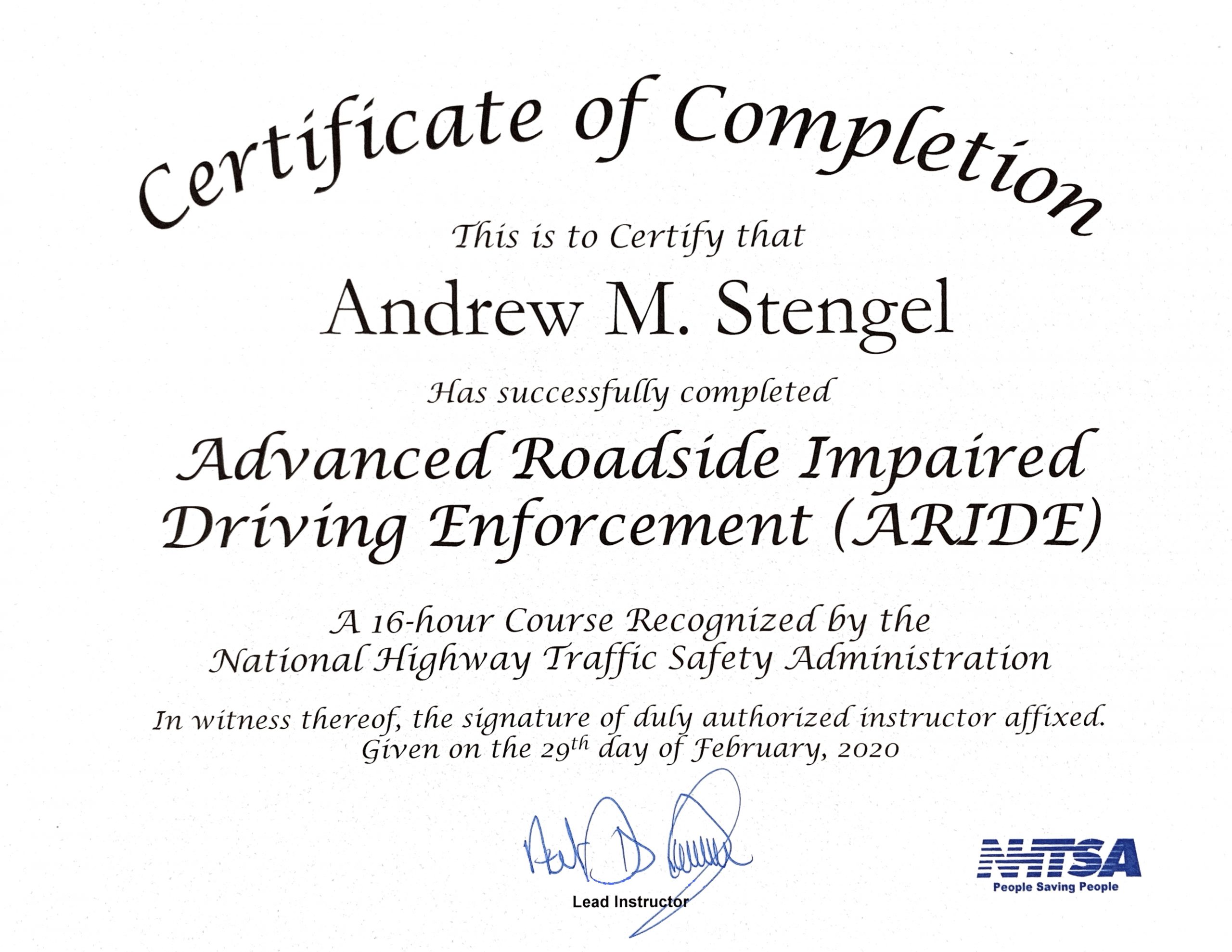New York DWI Lawyer
Facing DWI charges in NYC can be frightening and confusing–beginning with the terminology. New York law refers to Driving While Intoxicated (DWI), but the name of the crime varies from state to state, so you’ve probably heard the terms DUI (Driving Under the Influence), OUI (Operating Under the Influence) and OWI (Operating While Intoxicated) as well. Don’t worry. As NYC DWI Lawyers, are here to help you understand the charges, the possible penalties for DWI or DWAI in New York, and the defenses available to you.

NYC DWI Detection and Standardized Field Sobriety Testing (SFST) Certificate
Andrew M. Stengel is trained the same way as police to perform DWI Standardized Field Sobriety Tests.
The first thing you should know is that there are several different charges associated with driving under the influence of drugs or alcohol.
DWI Attorney NYC – The Law Firm of Andrew M. Stengel
One important consideration when hiring a DWI or DWI Drugs lawyer is the type of training the lawyer has. Police receive specialized training for DWIs including Standardized Filed Sobriety Tests (SFSTs) and Advanced Roadside Impaired Driving Enforcement (ARIDE). The best DWI and DWI Drugs lawyers in New York also have this training, which gives people facing prosecution a tremendous advantage.

NYC DWI and DWI Drugs Advanced Roadside Impaired Enforcement (ARIDE) Certificate
There are a few different ways a driver can be charged with misdemeanor Driving While Intoxicated by alcohol in the state of New York.
I hired Andrew to defend me against a DWI charge in New York City. There is no better DWI attorney in New York. I refused a breathalyzer and due to his work he got the case completely dismissed. I don’t mean an ACD—I mean dismissed in court. Andrew is aggressive, experienced and knowledgeable. He went above and beyond and saved me from a criminal conviction. I give Andrew my highest recommendation.
— Joel M., Client Testimonial on ThumbTack
Chemical Test Failure / Per Se Intoxication

The first and most straightforward is that the driver is charged with operating a motor vehicle with a blood alcohol content (BAC) of .08 percent or higher. This is often referred to as a “per se” DWI and is defined in Vehicle and Traffic Law Section 1192(2). Note that while .08 is often referred to as the legal limit, the legal limit is actually below .08 percent. At .08 (and above), the driver is violating the law.
A case involving a chemical or blood test result of .08 percent or greater may seem open and shut, and the prosecution will typically view that test result as strong evidence. But, there are a number of possible ways to challenge a chemical test result at trial. Failing a breathalyzer test does not necessarily mean a conviction!
DWI Without a Chemical Test Result / Common Law Intoxication
When a driver refuses the breathalyzer test, the state may still pursue a charge of common law intoxication, which is defined in Vehicle and Traffic Law Section 1192(3). It is unlawful in the state of New York to “operate a motor vehicle while in an intoxicated condition.”
Obviously, “in an intoxicated condition” is not nearly as clear as “BAC of .08 percent or greater.” That means, depending on the evidence, it is generally more difficult for the prosecution to meet its burden of proving guilt beyond a reasonable doubt. However, drivers can be convicted of Driving While Intoxicated without a chemical test result.
Some of the most common evidence used by prosecutors in DWI cases with no breathalyzer test result include:
- Performance of coordination tests for DWIs in New York, which are videotaped in New York City
- Performance of standardized field sobriety tests, which are more often performed by police outside of New York City
- Observations of the officer, including
- Watery and/or bloodshot eyes
- Slurred speech
- Unsteadiness on feet
- Odor of an alcoholic beverage
When do you need a lawyer when facing a DWI Charge in New York?
Read more about your rights to a DWI defense attorney in NYC, and the timing of hiring a New York Lawyer to defend you in your DWI case.
DWI Penalties in New York
Most first-offense DWI cases are misdemeanors, meaning that the maximum possible direct penalty includes:
- Up to 1 year in jail
- A fine of up to $1,000
- 6-month driver’s license revocation
- Up to 3 years’ probation
There are additional costs and consequences associated with a DWI conviction. For example, you can expect:
- A court surcharge of $395 (or $400 if in a Town or Village Court)
- A driver responsibility assessment of $250 per year for 3 years
- Required installation of an ignition interlock device on any car owned or operated by the person who was convicted for at least 6 months.As a practical matter, however, the typical first-time DWI offender with little or no criminal history is not sentenced to jail time in New York. In many instances, even a second-time offender may escape jail time.
If you’re facing DWI charges, there’s a lot on the line. Don’t try to handle it alone—contact us today and get the help you need.
Indirect Consequences of a DWI Conviction
A Driving While Intoxicated conviction, which results in a criminal record, will have consequences beyond the penalties and restrictions imposed by the legal system. For example, the conviction may impact eligibility for certain employment and licensing.
Impaired Driving in New York: DWAI

New York does have a non-criminal alcohol-related driving offense, which is called Driving While Ability Impaired or DWAI in New York. The charge is found under Vehicle and Traffic Law Section 1192(1). DWAI is a traffic infraction, it is not a crime. (Whereas, Driving While Ability Impaired By Drugs or DWAI By Drugs is a crime in New York.
DWAI is defined in the law as operating a motor vehicle “while the person’s ability to operate such motor vehicle is impaired by the consumption of alcohol.” A chemical test result of a BAC of less than .08% and more than .05% may result in a DWAI charge.
Possible Plea Bargain to DWAI
In some arrests and prosecutions for DWI in New York, it is possible to obtain a plea bargain offer to DWAI. Each District Attorney in New York’s 62 counties has their own policies. Generally speaking, it may be possible for a defense attorney to obtain a plea bargain to DWAI when DWI is charged if a breath test was .13% BAC or lower and the wasn’t an automobile crash related to the arrest. However, every case is different.
Aggravated DWI in New York
If the driver’s BAC is .18% or higher, the charge will be Aggravated DWI—even if the defendant has no criminal history. Aggravated DWI, Vehicle and Traffic Law Section 1192(2-a), generally carries more serious penalties than a straight Driving While Intoxicated charge, but it is still only a misdemeanor. That means that the maximum term of imprisonment remains one year. The primary difference in penalties is that an aggravated DWI conviction may result in:
- A fine of $1,000 to $2,500
- A minimum 1-year driver’s license suspension, with the possibility of a suspension for a second year
- Required installation of an ignition interlock device on any car owned or operated by the person who was convicted for at least 6 months.
Felony DWI in New York
Driving with an extremely high BAC isn’t in and of itself a felony in the state of New York. However, there are certain circumstances under which a person accused of Driving While Intoxicated will be charged with a Class E felony. The most common include:
- When the driver has a prior DWI conviction in any state within the previous ten years
- When the driver has a passenger who is 15 year old or less
The penalties for conviction of felony DWI may include:
- Up to 4 years in state prison
- A fine of between $1,000 and $5,000
- A court surcharge of $250
- A driver responsibility assessment of $250 per year for three years
- Probation for up to 5 years
- License revocation for one year, which may be extended by the court
- Mandated use of an ignition interlock device or at least 6 months


